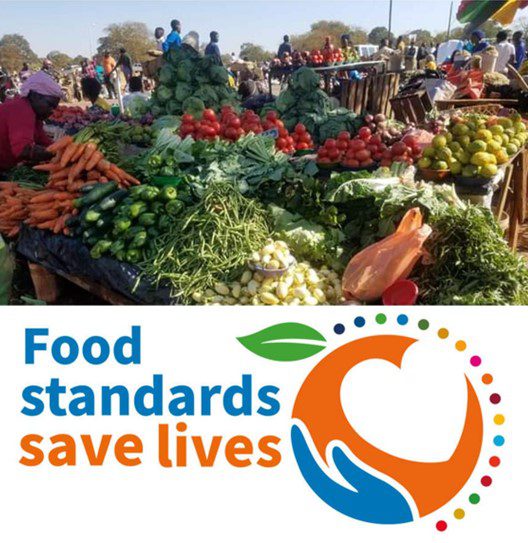Read in
“FOOD SAFETY is everyone’s business.” No matter who you are or what you do, you play an important role in making sure food is safe to eat.
Yes, without debate or argument, access to sufficient amounts of safe food is a key to sustaining life and promoting good health. Foodborne illnesses are usually infectious or toxic in nature and often invisible to the plain eye, caused by bacteria, viruses, parasites or chemical substances entering the body through contaminated food or water.
Food safety has a critical role in assuring that food stays safe at every stage of the food chain – from production to harvest, processing, storage, distribution, all the way to preparation and consumption.
An estimated 420 000 people around the world die every year after eating contaminated food and children under 5 years of age carry 40% of the foodborne disease burden, with 125 000 deaths every year, Zambia is non-exclusive. “Most diarrhea cases in Zambia are associated with food contamination, mainly in children,” the Minister of Health, Honourable Sylvia Masebo observes.
In order to change this despondency narrative, in collaboration with other relevant organizations in Zambia such as: Ministry of Health, Zambia Alliance for Agroecology and Biodiversity (ZAAB), Participatory Ecological Land Use Management (PELUM) – Zambia; FIAN International – Zambia, Community Technology Development Trust, SCOPE-Zambia, UBUNTU Learning Hub, Caritas, Zambia Climate Change Network; and partners like World Health Organization (WHO) and the Food and Agriculture Organization of the United Nations (FAO) jointly facilitated the observance of World Food Safety Day.
World Food Safety Day celebrated on 7th June annually across the globe highlights the importance of maintaining food standards. The theme of this year’s World Food Safety Day 2023 is: “Food Standards Save Lives.”
The international day is aim at inspiring the UN member nations to prioritise food safety standards and work collaboratively to protect consumers from foodborne diseases. Most people depend on the information in the packaging of consumable items to know whether their food is safe. These food safety standards guide farmers and those who process food.
World Food Safety Day draws attention and inspires action to help prevent, detect and manage foodborne risks, contributing to food security, human health, economic prosperity, agriculture, market access, tourism and sustainable development.
Zambia Alliance for Agroecology and Biodiversity (ZAAB)’s National Coordinator, Ms. Mutinta Nketani notes, “The biggest cause of unsafe food in Zambia is pesticide contamination. The big win is that, if Food Standards Save Lives, then chemical standards save lives! We call for the phasing out of toxic, unsafe, Highly Hazardous Pesticides across Zambia, to save lives.”
Modern farming practices have led to a rise in accumulation of pesticides, chemicals and additives in food which, if not regulated, will harm consumers. Water contamination is also a major problem. World Food Safety Day ensures that food standards are adhered to ensure optimum health for all consumers.
The Minister of Health, Honourable Sylvia Masebo said, “The producers, the retailers and consumers all play an important role in ensuring that the food safety is met. The Zambian government has put robust measures to improve the food safety, following the enactment of the Food Safety Act No: 7 of 2019.
The Zambian government through the Minister of Health has commenced the development of science driven food safety regulations, by going further to repeal the Food and Drug Act 1972 and sections 79 and 83 of the Public Health Act, 1930; and provide for matters connected with, or incidental to, the foregoing.
The Food Safety Act, No. 7 of 2019, “Provides for the protection of the public against health hazards and fraud in the manufacture, sale and use of food; provide for a streamlined process for regulatory clearances for regulatory health requirements for food premises; establish the Food Safety Coordinating Committee and provide for its functions and powers….”
Honourable Sylvia Masebo disclosed this during the launch of the World Food Safety Day 2023, “The Ministry of Health is in a final stage to appoint the members to the Food Safety Coordinating Committee in order to strengthen the stakeholders in food value chain.”
The significance of World Food Safety Day 2023; lies in several key aspects such as public health, global cooperation, food Security; and consumer awareness. Apparently, the World Food Safety Day plays a crucial role in raising consumer awareness about food safety issues. It encourages individuals to become more informed and vigilant about the safety and quality of the food they eat.
There is no food security without food safety. Food safety is an essential part of food security. Only when food is safe can it meet nutritional needs and help adults to live an active and healthy life and children to grow and develop.



